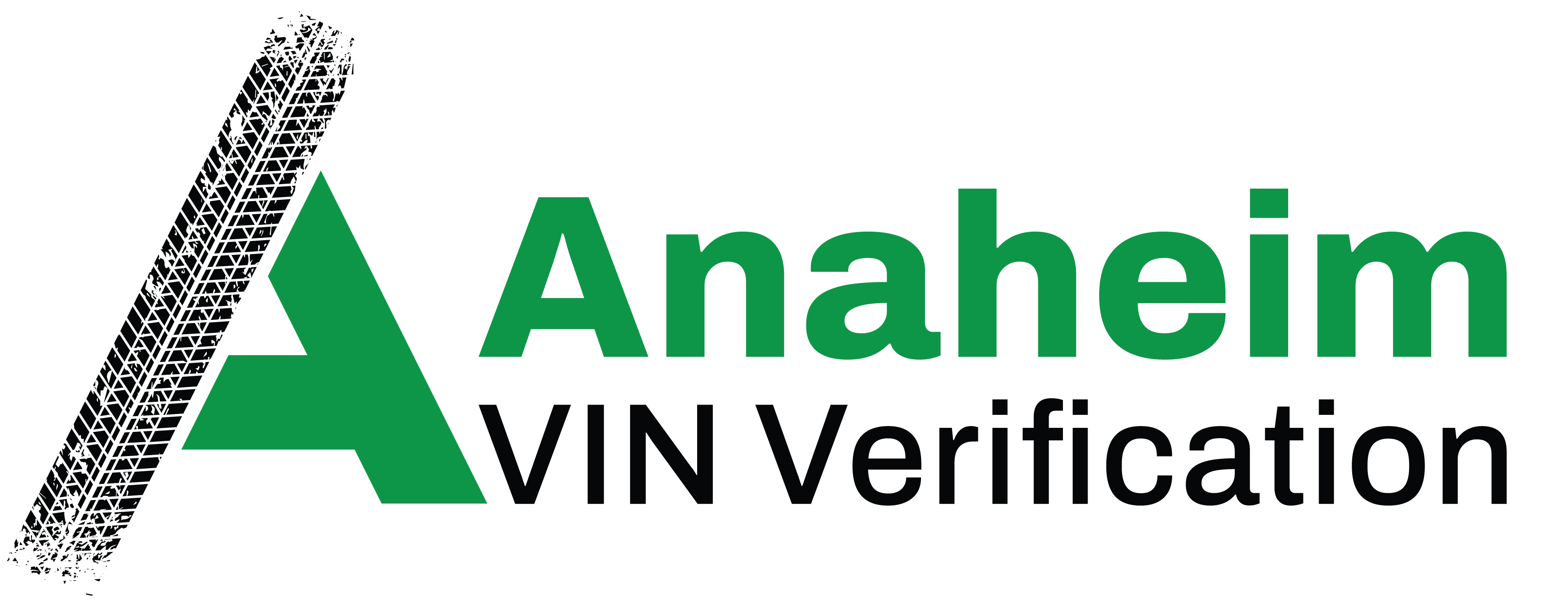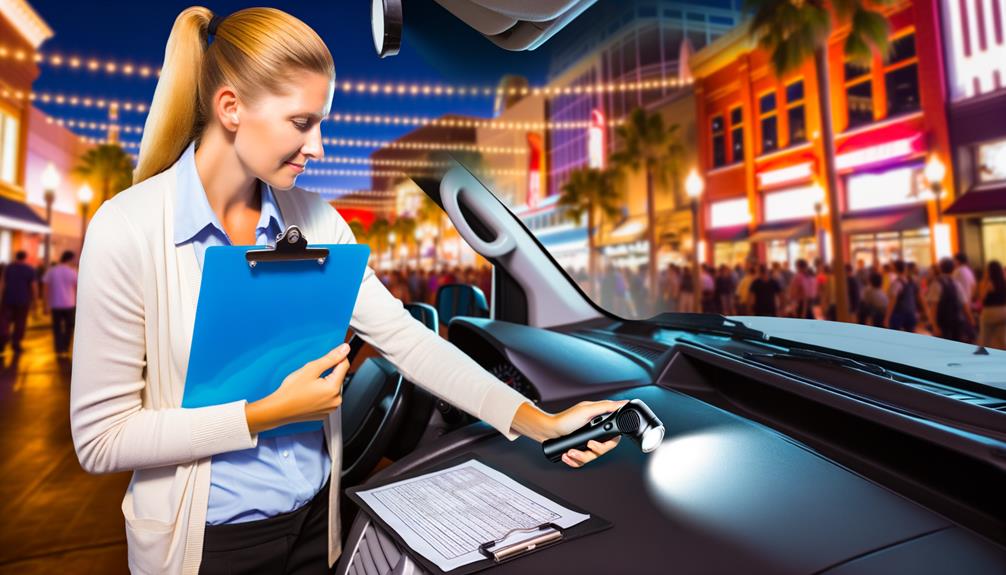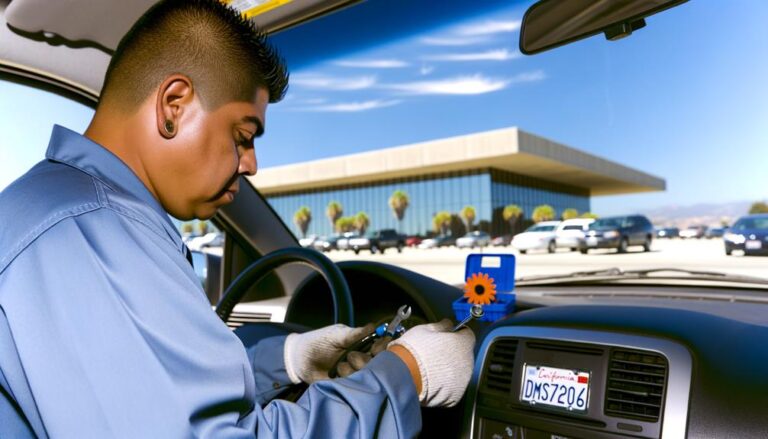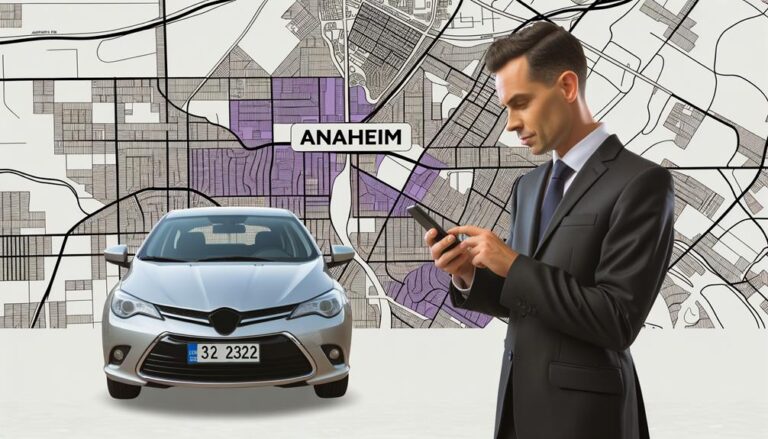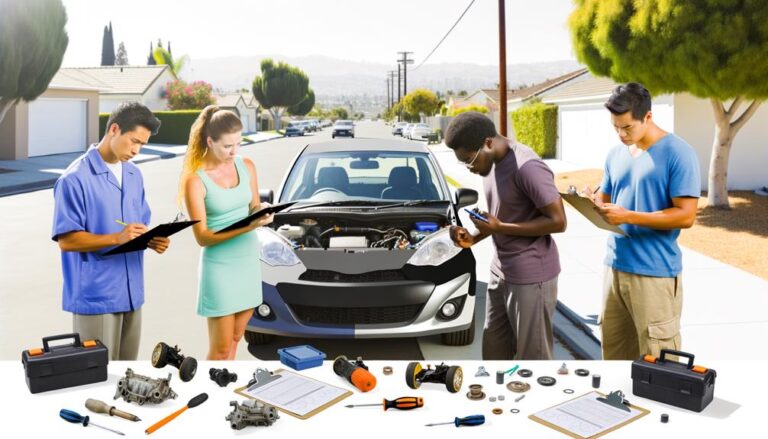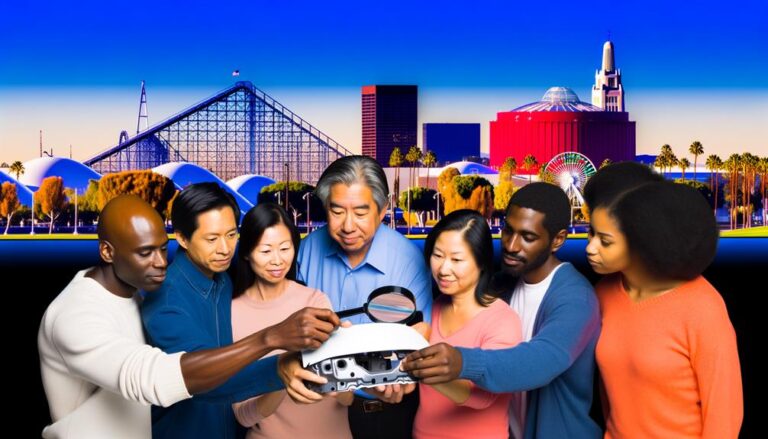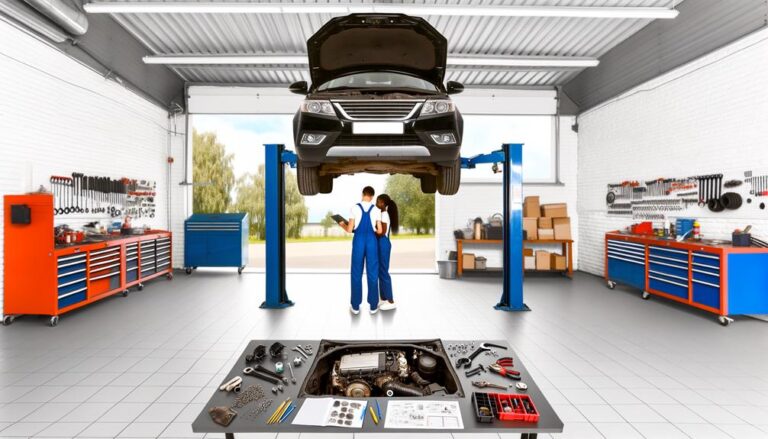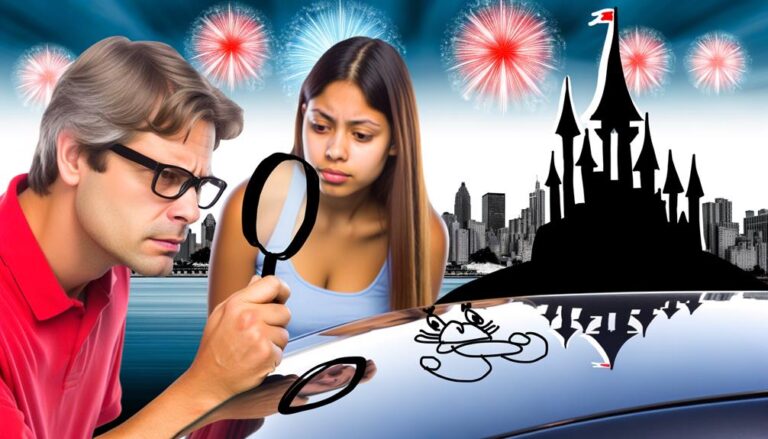How to Avoid Common Mistakes During VIN Verification in Anaheim
When you're gearing up for VIN verification in Anaheim, it's crucial to sidestep the typical pitfalls that could complicate the process. First, ensure you've got all the necessary documents well-organized and readily available. Double-check that the VIN on your vehicle precisely matches the one on your title and registration; this can't be overstressed. Misidentification of characters, especially with digits like '0' (zero) and 'O' (the letter O), is a common error. Now, imagine discovering more about the less obvious mistakes that even seasoned car owners overlook. What might those be, and how could they affect your verification outcome?
Understanding VIN Verification
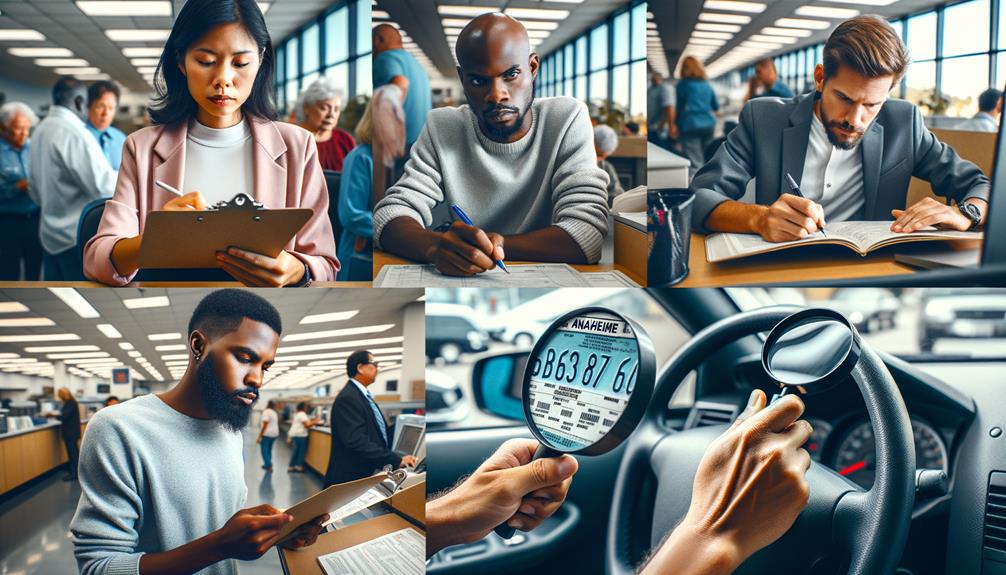
VIN verification is a crucial DMV inspection you must undergo to register an out-of-state vehicle in California, ensuring the vehicle's identity matches its documentation. This process isn't just a formality; it's a safeguard against theft and fraud, protecting your freedom to drive without legal hassles.
During the inspection, the DMV or a licensed verifier will check the vehicle identification number (VIN) against your vehicle's documentation to confirm they match. This check is essential, as a mismatch can flag potential issues or illegal modifications.
The DMV inspector will also verify the federal certification label, which confirms your vehicle meets necessary safety and emission standards. This label is crucial, especially for newer vehicles that must comply with stringent federal regulations.
The VIN verification process involves a detailed review of the vehicle, checking the year, make, model, and odometer reading, all documented on the REG31 form. This thorough inspection ensures every aspect of your vehicle is up to standard, allowing you to hit the road with confidence.
Required Documentation
Before you attend your VIN verification appointment, ensure you have gathered all the necessary documents, including the out-of-state title or registration card and proof of valid insurance. Being prepared empowers you to breeze through the process without unnecessary hiccups.
Among the required documentation for VIN verification, the Manufacturer's Statement of Origin (MSO) is crucial if your vehicle is new. If you're bringing a vehicle from out of state, the out-of-state title or registration card is mandatory.
Don't forget, your freedom on the road hinges on these essentials being in order. Also, remember to include your proof of insurance. It's not just a formality; it's your ticket to legal and worry-free driving in California.
For certain vehicles, a current smog certification is necessary. This isn't just about compliance; it's about contributing to California's blue skies.
Lastly, double-check that the VINs on your documentation align perfectly with the VIN on your vehicle. Any discrepancies could stall your registration process, wasting time you could spend cruising down the Pacific Coast Highway.
Keep in mind, aligning your documents correctly is key to a smooth verification at the California DMV.
Recognizing Common Errors
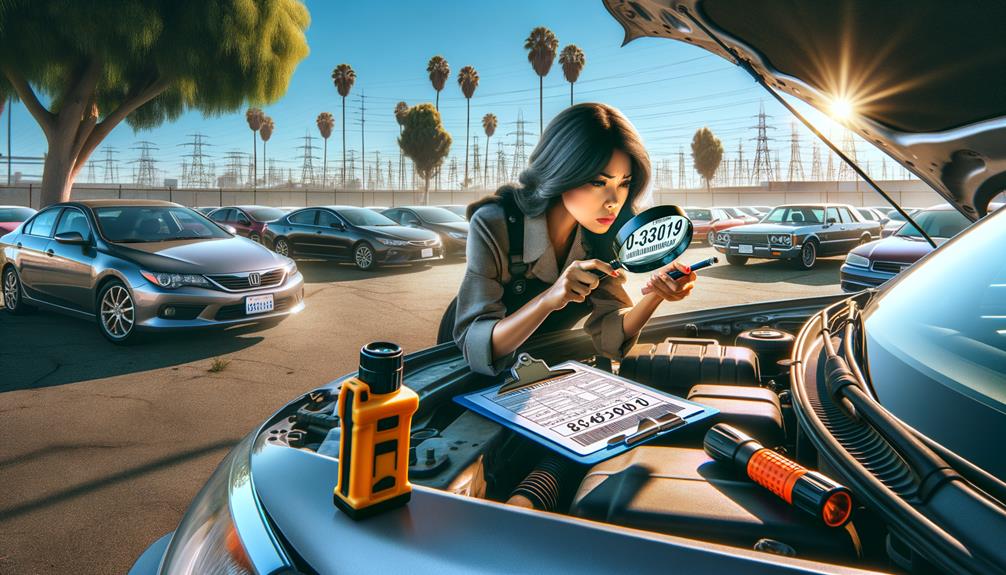
Recognizing common errors during VIN verification can save you both time and frustration. One of the most common mistakes is not ensuring the VIN on all your required documentation—such as the registration, title, and insurance—matches the VIN on your vehicle. This discrepancy often leads to complications during the verification process.
Before your inspection, double-check the specific VIN location on your vehicle. Misidentifying this can cause unnecessary delays. Make sure you're clear on distinguishing similar characters; it's easy to confuse the letter 'O' with the number '0,' or 'I' with '1.' These entry errors can skew results and extend the verification time.
Keep your documentation organized and readily accessible. Scrambling to find papers during your appointment can lead to missed information and further delays.
Also, regularly inspect the VIN plate for any signs of wear and damage. Conditions like corrosion or scratches can obscure the VIN, complicating the verification process in Anaheim.
Choosing Verification Locations
When selecting a location for VIN verification, consider what best meets your specific needs, such as convenience, cost, and type of service offered. In Anaheim, you've got several verification options, each with its pros and cons.
You might gravitate towards the DMV or CHP for free services, but remember, these might require prior appointments and referrals which can affect your schedule.
If you're all about flexibility and saving time, think about mobile services. While they aren't free, costing anywhere from $67 to $147, they offer the convenience of coming to you, making it worth the extra bucks for many. This choice is perfect if you're juggling a busy schedule or prefer the comfort of your own space for such tasks.
Before you decide, check the types of vehicles accepted at each location. For instance, if you're a AAA member, you can enjoy free VIN verification, but it's limited to certain vehicle types.
Always ensure you've all the necessary documentation, including proof of ownership, ready to go to avoid any hiccups. Don't get caught in common mistakes by overlooking these details, especially if your vehicle falls into a more complicated category like revived salvage vehicles.
Preparing for Inspection

To ensure a smooth VIN verification process, gather and organize all required documents, including your out-of-state title and any smog certifications, prior to your appointment. This preparation allows you the freedom to handle the inspection on your terms without unexpected delays.
Before you head out, double-check that the VIN on your vehicle matches exactly with the details on your title and registration. This VIN matching is crucial as any discrepancies can halt the process, trapping you in bureaucratic limbo. Remember, California law is specific about these aspects, and aligning with them beforehand will help you steer clear of complications.
Additionally, make sure your vehicle isn't classified as a revived salvage vehicle. Such classifications are a red flag under California regulations, rendering your vehicle ineligible for VIN verification.
Addressing VIN Discrepancies
Before you proceed with VIN verification in Anaheim, make sure you've addressed any discrepancies between the vehicle history report and your vehicle's physical VIN. This proactive approach ensures you're not caught off-guard by potential issues that can disrupt the process.
Start by obtaining a comprehensive vehicle history report to spot any VIN discrepancies early. It's crucial that the VIN on all your documents, including the title, registration, and insurance, matches exactly. Any mismatch can lead to registration complications during the VIN verification. If you find any inconsistencies, delve deeper to determine if they're due to clerical errors in past documentation. Ensure the accuracy of every detail to avoid unnecessary delays.
Also, maintain transparency about any modifications made to your vehicle. Undisclosed changes can be problematic, raising red flags during the verification process. By being upfront, you demonstrate responsibility and ensure the integrity of the verification process in Anaheim.
Costs and Fees Explained
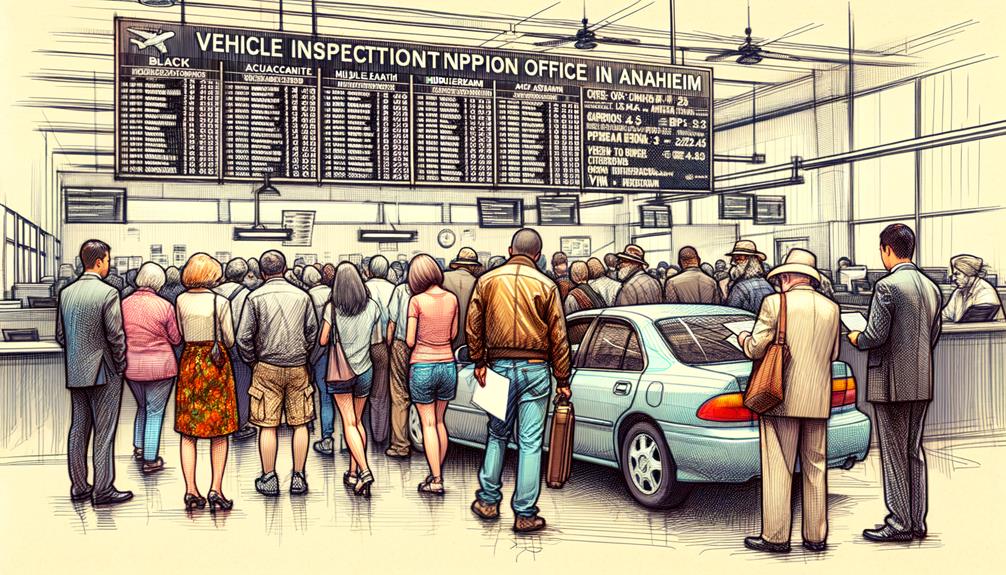
How much does VIN verification cost in Anaheim, and what payment methods are accepted?
At a fixed location, you'll typically shell out about $35 for Quick VIN Verification. However, if you prefer the convenience of mobile services within Orange County, be prepared to pay between $67 and $147, depending on your chosen provider and the distance they need to cover.
For those of you who value flexibility, you're in luck! Payment methods are quite varied, ranging from cash and checks to digital options like Zelle and Venmo, as well as the usual credit/debit cards.
For AAA members, there's even better news: you can access VIN verification services for free, although this doesn't extend to mobile services. On the other hand, both the DMV and CHP provide no-cost VIN verification, but remember, you'll need to make an appointment and ensure all your documentation is in order.
Understanding these costs and the variety of payment options is key to budgeting effectively, ensuring you're not blindsided by unexpected fees.
Plus, having the flexibility to choose from multiple payment methods means you can manage your finances in a way that best suits your needs in Anaheim.
Payment Options Available
When choosing your VIN verification service in Anaheim, it's crucial to verify which payment methods are accepted to avoid any surprises during the process.
You've got a range of payment options to suit your lifestyle and preferences. Most providers welcome traditional forms such as cash and checks, as well as modern digital payments including Zelle and Venmo. For those who prefer the usual swipe or tap, credit/debit cards are typically accepted too.
If you're an AAA member, remember that you can access VIN verification services for free at their offices, though this perk doesn't extend to mobile services.
Speaking of mobile services, the fees can vary significantly, so it's wise to confirm both the cost and accepted payment methods before booking. This ensures that the transaction goes smoothly without any hitches.
Flexibility is key here—you don't want to be caught off-guard. Whether you choose to go to a stationary location or opt for the convenience of mobile services, knowing your payment options in advance frees you up from unnecessary stress and lets you focus on the verification itself.
Always double-check with your chosen service provider to ensure there are no misunderstandings.
Following Up Post-Verification

Once you've selected your payment method and completed the VIN verification, it's important to ensure that all documentation, especially your REG31/VIN verifier form, is in order. This form is crucial for your DMV registration, serving as concrete proof of your completed verification process.
Next, don't just sit back; you've got to follow up. Reach out to the DMV to confirm processing of your VIN verification. This step is essential, particularly if you're hitting snags with your registration. It's all about staying ahead and keeping those potential complications at bay.
Keep an eye on your registration renewal notices too. Sometimes, they hint if you need to redo VIN verification, maybe due to a change in ownership or other updates. This foresight saves you from last-minute hassles and ensures continuous freedom with your vehicle.
Also, stay vigilant for any discrepancies that might pop up post-verification. If something doesn't match up, contact your verifier or the DMV swiftly to clarify. This proactive approach prevents any future registration issues.
Lastly, regularly check for any vehicle recalls using your VIN. Unresolved issues can hinder your registration processes, so keeping informed empowers you to tackle them head-on.
Frequently Asked Questions
What Do They Check for VIN Verification in California?
You're wondering what they check during VIN verification in California? They verify the vehicle's make, model, year, and VIN, check the odometer, and ensure the federal certification label is present and visible.
How Long Does CHP VIN Verification Take?
CHP VIN verification usually takes 30 minutes to an hour. You'll save time by scheduling an appointment. The process can vary depending on the vehicle's complexity and any additional paperwork needed.
How Much Does a VIN Verification Cost in California?
You'll find that VIN verification costs vary in California. Expect to pay around $75 for in-person checks and up to $125 for mobile services. If you're a AAA member, it's free without mobility.
Does AAA Do VIN Verification in California?
Yes, AAA does offer VIN verification in California, but you'll need to be a member and visit a participating location. It's free, yet doesn't cover mobile services or certain vehicle types like salvage.
